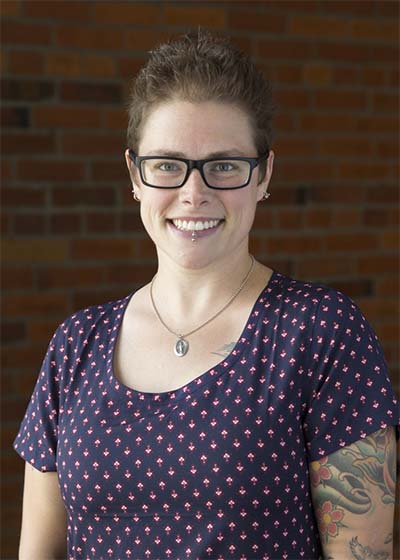Writing Workshops Help Veterans and Dependents Tell Their Stories
UW Tacoma Lecturer Abby Murray is helping veterans and military dependents express themselves in her writing workshops.

William Faulkner once said "if a story is in you, it has to come out." The famed author preceded the rise of social media and its promotion of self-expression, but the sentiment is at least as relevant today as it was in the early 20th century. In this age of sharing, being heard can be difficult. "I want to find the people who don't feel like they're wanted," said UW Tacoma Lecturer Abby Murray.
A desire to help others find their creative voice is one reason Murray started writing workshops for military veterans and their dependents. Murray, a poet, teaches writing classes at UW Tacoma. "I started here in the fall of 2015 and I had a lot of students who were military dependents, and I noticed in their writing a sense of not belonging," she said.
Murray decided she could help by doing what she does best. She launched her first workshop in the spring of 2016 for military dependents. "Almost immediately I had veterans asking me if they could come, so I decided to create another workshop just for them," said Murray.
The workshops are not connected to a class; Murray hosts them on her own time. Murray isn't a vet but her husband is in the U.S. Army. "I know what it's like to have to straddle these two different worlds and feel like you don't quite belong in either one," she said.
Last year's workshops were so successful Murray decided to do them again in the spring and winter quarters. The winter workshop is for veterans and active duty personnel. The dates and times are: Jan. 19 and 26 from 5:30-6:30 p.m. and Feb. 2 and 9 from 5:30-6:30 p.m. All of the workshops will be held in the Tioga Library room 307A. The spring schedule for dependents hasn't been determined.
Writing Studies major Jenny Miller participated in the workshops. The UW Tacoma senior is a dependent and a veteran: she served three years in the Army. The 39-year-old started out as a communications major but switched after taking a genre writing class from Assistant Professor Michael Kula. "I fell in love with the work and made the switch," said Miller.
Writing can be a cathartic process; getting one's feelings out can be therapeutic. Miller agrees with this sentiment. "I didn't realize I had a lot to say until I started writing about it," she said. "These workshops have helped me process stuff that I didn't realize I needed to process."
Writing is one thing, but letting other people hear what you wrote is another. Miller says the workshops are a relaxed environment free of judgement. "Abby is great at facilitating a very open, safe space," said Miller. Participants don't have to share what they've written. Murray gives them prompts and they compose something based off that idea. It's up to each person to decide if they feel comfortable reading what they wrote.
Miller has taken material developed in the workshops and turned it into finished pieces. She's taken this work beyond the classroom to public readings. "Doing these readings and getting positive feedback has helped my confidence and makes me want to do more," said Miller.
“Self-expression is inherent within writing, and expression is often a method of understanding one’s mind.”
You don't have to be a "writer" to take part in these workshops. The only requirement is that you're a veteran or a dependent with a story to tell. Murray's definition of dependent includes significant others, spouses, close friends, and family members.
Faulkner's message was, "if a story is in you, it has to come out." Jenny Miller puts it another way. "Whatever is going on in your head, whatever you need, whatever inspires you to write — write."
[Editor's note: Another UW collaborative writing project with JBLM is the Red Badge Project, which helps wounded veterans "discover and give voice to their unique stories." More: "Helping Soldiers Tell Their Stories," A&S Perspectives, UW College of Arts & Sciences.]



